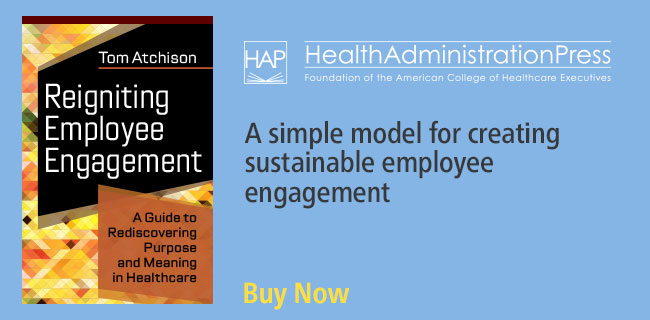
- News Spotlight:
Keeping Staff and Patients Safe From Violence - Don’t Wait Until It’s Too Late—Recertify Your FACHE® Today
- New Book on Reigniting Employee Engagement
- Perspectives on National Hispanic Heritage Month
- Navigate Forward With the Baldrige Virtual Fall Conference This Week
- CMS To Cover Pneumococcal Conjugate Vaccine
Keeping Staff and Patients Safe From Violence
Amid the numerous challenges healthcare workers are facing with the pandemic, some are also dealing with the threat of violence from co-workers or patients. In Philadelphia, a nursing assistant was fatally shot Oct. 4 by a co-worker. Meanwhile, in California, the San Leandro Hospital ED went into lockdown recently when a visitor, agitated about being barred from seeing a patient due to COVID-19 restrictions, threatened to bring a gun into the facility.
Workplace violence isn’t a new phenomenon in healthcare facilities, but some workers feel the pandemic is exacerbating the problem, according to several news reports, such as this article from Kaiser Health News. Although challenging, it is possible to dramatically reduce workplace violence, according to a feature article in Healthcare Executive about keeping staff and patients safe. As you will read, there isn’t one solution to successfully reduce violent episodes. Instead, multifaceted initiatives backed and supported by senior executives are needed, such as providing de-escalation training.
Read the full story on HealthcareExecutive.org and learn about seven strategies that healthcare leaders cite as critical in any comprehensive campaign aimed at reducing violence, particularly incidents involving patients and other customers.
Don’t Wait Until It’s Too Late—Recertify Your FACHE® Today
If you are an ACHE Fellow whose credential is set to expire this year, now is the time to recertify. This includes Fellows whose credentials were set to expire in 2020 who were granted an extended deadline of Dec. 31, 2021. Don’t delay. ACHE encourages Fellows who have met the requirements to recertify now. In addition, any continuing education hours and volunteer activities earned during the remainder of the year—after you have recertified—may count toward your next recertification cycle. Fellows can recertify in three easy steps:
- Complete 36 hours of continuing education activities (12 hours must be ACHE Face-to-Face Education) or retake and pass the Board of Governors Exam.
- Complete four volunteer activities.
- Pay the recertification fee of $200 when you submit your recertification application by the Dec. 31 deadline.
You can learn more about the recertification process by visiting ache.org/FACHE and selecting the Maintain/Recertify My FACHE button from the menu.
Additionally, if you are over the age of 60 and will retire within the next five years, you may be eligible for a one-time only five-year recertification waiver. For more information, please contact Customer Service at (312) 424-9400 or contact@ache.org.
Current Fellows who are in good standing and are retired from healthcare management may transfer to Retired Status or Life Status. Learn more about the FACHE(R) and LFACHE designations here.
New Book on Reigniting Employee Engagement
In the first chapter of his new book, Thomas A. Atchison, EdD, asks whether an antidote exists for a healthcare system fraught with multiple challenges such as fragmentation, uncertainty and frustration at all levels. His response to his own question is yes. “The key to sustainable success within a VUCA [volatile, uncertain, complex and ambiguous] world is to create a corporate culture that allows all trustees, executives, physicians, nurses, clinicians, and professional support personnel to express meaning and find purpose in their work,” he writes in Reigniting Employee Engagement: A Guide to Rediscovering Purpose and Meaning in Healthcare.
He proposes the use of a simple model for creating sustainable employee engagement that can help healthcare leaders refocus on basic human needs in their efforts to reenergize the workforce. Atchison also explores the psychology of why and how people commit to their work and weaves in interviews with executives who have successfully approached employee engagement.
Now through Nov. 1, members and nonmembers can save 20% on this book by using promo code ENGAGE at checkout. Some exclusions apply. Order online or by calling (800) 888-4741.
Perspectives on National Hispanic Heritage Month
National Hispanic Heritage Month, which ended Oct. 15, acknowledges the contributions of Hispanic Americans to the history and culture of the United States. In a recent ACHE Blog post, Astrid Gonzalez Parilla, OTD, FACHE, senior vice president of operations at Good Shepard Rehabilitation Network, Allentown, Pa., shares her reflections on heritage and the wisdom she’s received from her predecessors. Learn how the principles of strength, compassion and grace have provided her with solace when facing the many challenges of today’s healthcare landscape.
Navigate Forward With the Baldrige Virtual Fall Conference This Week
The Baldrige Virtual Fall Conference, “Navigating Forward. Destination Excellence.” will be taking place this Thursday and Friday, Oct. 21–22. During this two-day interactive, live virtual conference, more than 300 attendees will have over 20 sessions to choose from. They can attend pre-conference workshops, hear from 2020 Baldrige Award recipients including ACHE member-led GBMC HealthCare System and Wellstar Paulding Hospital, as well as keynote speaker Heather E. McGowan, a future-of-work strategist. Register today.
CMS To Cover Pneumococcal Conjugate Vaccine
The Centers for Medicare & Medicaid Services recently announced that Medicare began covering Pneumococcal conjugate vaccine, 20 valent, on Oct. 1. CMS suggests submitting separate claims for this vaccine, using HCPCS code 90677. Part A Medicare Administrative Contractors, known as MACs, will hold these claims until the April 2022 system update, but Part B MACs began processing these claims Oct. 4. CMS will deny claims for vaccines provided July 1 through Sept. 30, before the vaccine was covered by Medicare.




